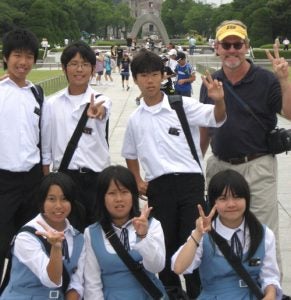ECU professor leads teachers on Japan study abroad
GREENVILLE, N.C. — The beautiful Zen gardens, the historic Buddhist temples and Shinto Shrines, even the conveyor belt that serves sushi at restaurants all fascinated 14 North Carolina teachers who traveled to Japan this summer on a study abroad seminar.
Led by John Tucker, professor of history and director of Asian Studies at East Carolina University, the month-long trip provided an extraordinary opportunity for teachers to learn about Japanese culture, history and schooling.

John Tucker, professor of history and director of Asian Studies at ECU, poses with schoolchildren during a trip to Japan.
“It was like a visual feast,” said Catherine Allen who teaches social studies at the Oakwood School. “I couldn’t tell you how many thousands of pictures I took. I just kept hoping I would somehow be able to capture what I was experiencing.”
The group – made up of public and private school teachers from around the state and three ECU Teaching Fellows – stayed in Kyoto and conducted field studies at historical sites and cultural events.
They visited more than two dozen Buddhist temples and Shinto shrines, saw three samurai castles and toured the ancient imperial palace in Kyoto, the current imperial palace in Tokyo and the Hiroshima Peace Park.
In addition, they attended a Noh play, a kabuki performance and a dance performance by maiko (apprentice geisha). They donned kimonos and took part in a traditional Kyoto-style multi-course meal, watched a Japanese baseball game, took a day-trip to Tokyo Disney and enjoyed many more cultural activities.
“It was a continual pleasure for me,” said Tucker, who led a similar tour last summer. “There was a lot of activity, and we were determined not to miss a second of it.”
For many of the teachers, the most informative part of the trip came on visits to Japanese schools and universities. The teachers were special guests at five universities, where they had the opportunity to discuss Japanese and American educational theories.
They also visited K-12 schools to watch Japanese classrooms in action. There, they saw differences in approach between Japanese and American systems. Japanese students appeared motivated to learn, had more responsibility at younger ages and received lessons in practical life skills in addition to traditional subjects.
Glenna Theurer, who teaches Suzuki Method violin, a style that originated in Japan, noticed how society informs the country’s teaching philosophies. “It is interesting to see how much of the philosophy of that method was rooted in the value system of Japan, the religion and the culture, and to realize how much of that is the norm in education there,” she said.
Though philosophies may differ, Japanese students seemed to share many of the same interests as American kids, said Damon Percy, an ECU Teaching Fellow. “I didn’t see too much of a difference in their lives versus the lives of children here,” he said.
A grant from the U.S. Department of Education Fulbright-Hays Group Project Abroad Program covered the costs of the trip, about $84,000.
Before traveling, most of the teachers had completed seminars devoted to education about Asia sponsored by the North Carolina Teaching Asia Network (NCTAN) based in University of North Carolina- Chapel Hill. Led by Tucker, the ECU-NCTAN seminar included presentations about Asian history, language and culture by ECU faculty and guest lecturers.
The teachers will receive academic credit for their field studies and will complete lesson plans showing how they will integrate what they learned about Japanese history, language and culture into their teaching.